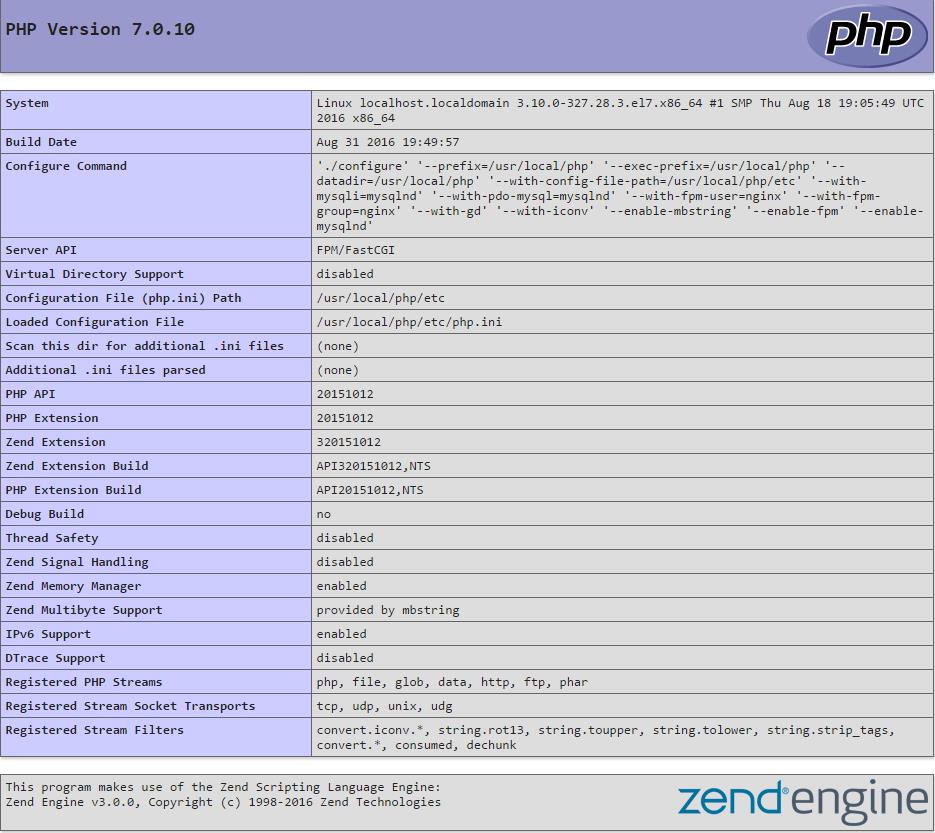CentOS 7.2mini版本下编译安装php7.0.10+MySQL5.7.14+Nginx1.10.1
Posted gentsir
tags:
篇首语:本文由小常识网(cha138.com)小编为大家整理,主要介绍了CentOS 7.2mini版本下编译安装php7.0.10+MySQL5.7.14+Nginx1.10.1相关的知识,希望对你有一定的参考价值。
一、安装前的准备工作
1、更新系统、禁止SELINUX、安装php、mysql、Nngix所依赖的包、删除系统自带的mysql配置文件
[root@localhost ~]# yum -y update
[root@localhost ~]# vi /etc/selinux/config # 设置SELINUX=disabled
[root@localhost ~]# yum -y install gcc gcc-c++ autoconf automake cmake bison ncurses-devel m4 libxml2 systemd-devel libxml2-devel libcurl-devel libjpeg-devel libpng-devel libicu-devel sqlite-devel bzip2 bzip2-devel libtool
[root@localhost ~]# mv /etc/my.cnf /etc/my.cnf.bk
2、下载以下包 #我把所有源文件都下载在root目录,读者可自行修改源文件存放目录
3.1 libmcrypt-2.5.8.tar.gz
3.2 mcrypt-2.6.8.tar.gz
3.3 mhash-0.9.9.9.tar.gz
3.4 zlib-1.2.8.tar.gz
解压并安装如:
#tar -zvxf libmcrypt-2.5.8.tar.gz
#cd libmcrypt-2.5.8
#./configure
#make && make insatll
3、在安装软件时如果提示有什么依赖包没有安装的可以再执行yum install * -y (*表示相关包)
二、编译安装nginx
1、去官网http://nginx.org/en/download.html下载最nginx-1.10.1.tar.gz的稳定版本
2、编译步骤如下
1、通过winSCP上传nginx-1.10.1.tar.gz到/root目录下
1.1 groupadd -r nginx #新建nginx组
1.2 useradd -r -g nginx -s /bin/false nginx #新建无登录权限的nginx用户
1.3 id nginx #查看nginx组及用户
2、tar -zvxf nginx-1.10.1.tar.gz
3、cd nginx-1.10.1
4、可通过./configure --help查看编译配置参数,也可参考http://nginx.org/en/docs/configure.html,下列参数要写在一行中
./configure --prefix=/usr/local/nginx1.10 --modules-path=/usr/local/nginx1.10/modules --with-http_ssl_module --pid-path=/usr/local/nginx1.10/nginx.pid --user=nginx --group=nginx
5、make && make install #编译并安装
6、启动nginx
6.1 cd /usr/local/nginx
6.2 sbin/nginx #启动,可使用sbin/nginx -?查看nginx相关操作命令
7、在/usr/lib/systemd/system目录下新建nginx.service文件,这样就可以通过systemctl stop|start|reload nginx.service来操作nginx,也可参考https://www.nginx.com/resources/wiki/start/topics/examples/systemd/,内容如下:
[Unit] Description=The NGINX HTTP and reverse proxy server After=syslog.target network.target remote-fs.target nss-lookup.target [Service] Type=forking PIDFile=/usr/local/nginx1.10/nginx.pid ExecStartPre=/usr/local/nginx1.10/sbin/nginx -t ExecStart=/usr/local/nginx1.10/sbin/nginx ExecReload=/usr/local/nginx1.10/sbin/nginx -s reload ExecStop=/usr/local/nginx1.10/sbin/nginx -s stop PrivateTmp=true [Install] WantedBy=multi-user.target
三、编译安装MySQL
1、去官网http://dev.mysql.com/Downloads/MySQL-5.7/mysql-boost-5.7.14.tar.gz下载带boost的5.7.14版本
2、编译步骤如下
1、用winSCP上传mysql-boost-5.7.14.tar.gz到/root目录下
2、groupadd mysql
3、useradd -r -g mysql -s /bin/false mysql
4、用cmake编译mysql, 相关参数可以参考https://dev.mysql.com/doc/refman/5.7/en/source-configuration-options.html,下列参数要写在一行
cmake -DCMAKE_INSTALL_PREFIX=/usr/local/mysql5.7 -DMYSQL_UNIX_ADDR=/usr/local/mysql5.7/mysql.sock -DSYSCONFDIR=/usr/local/mysql5.7/etc -DSYSTEMD_PID_DIR=/usr/local/mysql5.7 -DDEFAULT_CHARSET=utf8 -DDEFAULT_COLLATION=utf8_general_ci -DWITH_INNOBASE_STORAGE_ENGINE=1 -DWITH_ARCHIVE_STORAGE_ENGINE=1 -DWITH_BLACKHOLE_STORAGE_ENGINE=1 -DWITH_PERFSCHEMA_STORAGE_ENGINE=1 -DMYSQL_DATADIR=/usr/local/mysql5.7/data -DWITH_BOOST=boost -DWITH_SYSTEMD=1
5、make && make install
6、配置mysql并初始化数据库
6.1 cd /usr/local/mysql #进入编译目录
6.2 chown -R mysql . #修改目录所有者
6.3 chgrp -R mysql . #修改目录组
6.4 cp /usr/local/mysql/support-files/mysql.server /etc/init.d/mysqld #配置mysqld服务
6.5 cp /usr/local/mysql/support-files/my-default.cnf /usr/local/mysql/my.cnf #配置my.cnf
6.5.1 复制以下内容到my.cnf文件中的[mysqld]下
user = msyql
basedir = /usr/local/mysql
datadir = /usr/local/mysql/data
port = 3306
server_id = /usr/local/mysql/mysqld.pid
socket = /usr/local/mysql/mysql.sock
6.5 chkconfig mysqld on #设置mysqld开机自启
6.6 bin/mysqld --initialize-insecure --user=mysql --basedir=/usr/local/mysql --datadir=/usr/local/mysql/data #初始化数据库
6.7 bin/mysqld --user=mysql & #启动mysql, 如果报Please read "Security" section of the manual to find out how to run mysqld as root!,就在my.cnf中加入user=root, 表示以root用户启动
6.8 vi .bash_profile # 设置环境变量
PATH=$PATH:$HOME/bin:/usr/local/mysql5.7/bin
7、修改root用户登录密码并允许root用户远程登录
7.1 mysql -u root --skip-password
7.2 ALTER USER \'root\'@\'localhost\' IDENTIFIED BY \'123456\';
7.3 允许root用户远程登录
7.3.1 use mysql;
7.3.2 update user set host=\'%\' where user=\'root\' and host=\'localhost\'; #允许
(update user set host=\'localhost\' where user=\'root\'; #禁用)
7.3.3 flush privileges;
7.3.4 service mysqld restart
8、解决service mysqld start|stop报MySQL server PID file could not be found!或者Couldn\'t find MySQL server (/usr/local/mysql/bin/mysqld_safe), 其实可通过阅读此文件解决相关错误
8.1 chmod 777 /usr/local/mysql #因我设置mysqld.pid文件保存在/usr/local/mysql目录,所以保证其有可写权限
8.2 通过winSCP修改/etc/init.d/mysqld文件
8.2.1 basedir=/usr/local/mysql #手动指定
8.2.2 datadir=/usr/local/mysql/data #手动指定
8.2.3 mysqld_pid_file_path=/usr/local/mysql/mysqld.pid #手动指定
8.2.4 把此文件中所有未注释的含有mysqld_safe的字符替换成mysqld
四、编译安装php
1、去官网http://php.net/downloads.php下载php7.0.10版本
2、编译步骤如下
1、用winSCP上传php-7.0.10.tar.gz到/root目录下
2、tar -zvxf php-7.0.10.tar.gz #解压
3、配置编译php参数, 可使用./configure --help命令查看所有编译配置项目, 下列参数要写在一行中
./configure --prefix=/usr/local/php7.4 --exec-prefix=/usr/local/php7.4 --datadir=/usr/local/php7.4 --with-config-file-path=/usr/local/php7.4/etc --with-mysqli=mysqlnd --with-pdo-mysql=mysqlnd --with-fpm-user=nginx --with-fpm-group=nginx --with-gd --with-iconv --enable-mbstring --enable-fpm --enable-mysqlnd
4、make && make install #编译并安装
5、cd /usr/local/php #进入编译目录
6、修改相关配置文件
6.1 cp /usr/local/php/etc/php.ini.default /usr/local/php/etc/php.ini #php.ini中相关配置依项目需要自行修改,配置nginx支持php参考http://php.net/manual/zh/install.unix.nginx.php
6.2 cp /usr/local/php/etc/php-fpm.conf.default /usr/local/php/etc/php-fpm.conf #去掉[global]项下pid前的;
6.3 cp /usr/local/php/etc/php-fpm.d/www.conf.default /usr/local/php/etc/php-fpm.d/www.conf #大致在23、24行修改user和group如:user = nginx,group = nginx
7、chmod 777 /usr/local/php/var/run #默认PID文件是写在/usr/local/php/var/run这个目录中,所以修改目录权限
8、sbin/php-fpm #启动php, 可通过sbin/php-fpm -h 查看相关操作命令列表
9、在/usr/lib/systemd/system目录下新建php-fpm.service文件,这样就可以通过systemctl stop|start|reload php-fpm.service来操作php-fpm,内容如下:
[Unit]
Description=The PHP FastCGI Process Manager
After=syslog.target network.target
Before=nginx.service
[Service]
Type=forking
PIDFile=/usr/local/php/var/run/php-fpm.pid
ExecStart=/usr/local/php/sbin/php-fpm
ExecStop=/bin/kill -QUIT `cat /usr/local/php/var/run/php-fpm.pid`
ExecReload=/bin/kill -USR2 `cat /usr/local/php/var/run/php-fpm.pid`
PrivateTmp=true
[Install]
WantedBy=multi-user.target
10、安装php相关扩展, 下面以编译mysqli为例
10.1 cd /root/php-7.0.10/ext/mysqli #首先必须进入php源文件解压后所在目录,不然在执行phpize时会报Cannot find config.m4
10.2 /usr/local/php/bin/phpize #执行phpize,/usr/local/php/bin这个目录是编译后php所在目录
10.3 ./configure --with-php-config=/usr/local/php/bin/php-config
10.4 make && make install #执行完这一步后,会在/usr/local/php/lib/php/extensions/no-debug-non-zts-20151012目录下生成mysqli.so文件
10.5 vi /usr/local/php/etc/php.ini #在php.ini[Dynamic Extensions]下新增extension=mysqli.so
10.6 重启Nginx/Apache、重启php-fpm
五、安装redis及phpredis扩展
1、用winSCP上传redis-3.0.0.tar.gz到/root目录下
2、tar -zvxf redis-3.0.0.tar.gz -C /usr/local #解压到/usr/local目录下
3、yum install tcl -y #redis-test依赖此包
4、cd /usr/local/redis-3.0.0
5、chmod 777 . #当前目录可写,我把redis.pid文件指定到了/usr/local/redis-3.0.0下
6、make && make install
7、vi /usr/local/redis-3.0.0/redis.conf #修改redis配置文件
7.1 daemonize yes
7.2 pidfile /usr/local/redis/redis.pid
8、src/redis-server & #启动redis
src/redis-cli shutdown #关闭redis
src/redis-server --help #查看相关帮助命令
9、在/usr/lib/systemd/system目录下新建redis.service文件,这样就可以通过systemctl stop|start redis.service来操作redis,内容如下:
[Unit]
Description=The Redis 3.0.0 Service
After=syslog.target
[Service]
Type=forking
PIDFile=/usr/local/redis/redis.pid
ExecStartPre=/usr/local/redis/src/redis-server /usr/local/redis/redis.conf
ExecStart=/usr/local/redis/src/redis-server /usr/local/redis/redis.conf
ExecStop=/usr/local/redis/src/redis-cli shutdown
PrivateTmp=true
[Install]
WantedBy=multi-user.target
10、安装phpredis扩展,下载地址:https://github.com/phpredis/phpredis/releases
10.1 用winSCP上传phpredis-3.0.0.tar.gz到/root目录下
10.2 tar -zvxf phpredis-3.0.0.tar.gz -C /usr/local #解压到/usr/local目录下
10.3 cd /usr/local/phpredis-3.0.0
10.4 /usr/local/php/bin/phpize
10.5 ./configure --with-php-config=/usr/local/php/bin/php-config
10.6 make && make install
10.7 在php.ini文件中添加extension=redis.so
10.8 重启Nginx/Apache、重启php-fpm
六、至此在我的VirturBox中CentOS7.2下成功搭建了LNMP环境

以上是关于CentOS 7.2mini版本下编译安装php7.0.10+MySQL5.7.14+Nginx1.10.1的主要内容,如果未能解决你的问题,请参考以下文章